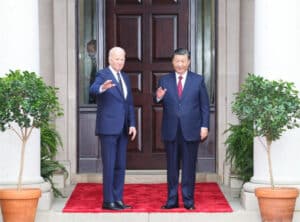
On November 15, local time, Chinese President Xi Jinping and US President Joe Biden met at the Filoli State in San Francisco, California, for a summit meeting. The two leaders engaged in a comprehensive and in-depth discussion on a range of topics affecting global peace and development as well as strategic and broad themes that are vital to the future of China-US ties.
In the era of unprecedented global transformations, Xi observed that China and the United States faced two choices: either strengthen solidarity and cooperation and work together to address global challenges and advance global security and prosperity, or stick to the zero-sum mentality, incite rivalry and confrontation, and lead the world toward chaos and division. Xi asserts that the two options indicate two distinct paths that will determine the fate of both Earth and humanity.
Turning one’s back on the other is not an option for China and the United States, according to Xi, who also stated that the relationship between the two countries—the most significant bilateral partnership in the world—should be viewed and envisioned in that broad framework. “It is unrealistic for one side to remodel the other. And conflict and confrontation have unbearable consequences for both sides. Major-country competition cannot solve the problems facing China and the United States or the world. The world is big enough to accommodate both countries, and one country’s success is an opportunity for the other,” Xi stated.
Xi also emphasized that the lessons from the 50 years of China-US ties, as well as the major international conflicts throughout history, were those of mutual respect, peaceful cohabitation, and win-win collaboration. Xi added that great efforts should be made by China and the US to follow them.
I stated in San Francisco that the two parties should adopt a fresh perspective and jointly construct five foundations for ties between China and the US. Developing a correct perception together, effectively managing disagreements, advancing mutually beneficial collaboration, sharing responsibilities as major nations, and fostering people-to-people exchanges were the five pillars.
Xi went into more detail regarding China’s steadfast stance on the Taiwan dispute. He stated that although the United States made encouraging remarks in the Bali meeting, China takes the Taiwan topic seriously and that it continues to be the most sensitive and significant issue in China-US ties.
Upon invitation, Biden welcomed Xi to the United States and expressed his gratitude. He stated that he has always thought that the bilateral relationship between the United States and China is the most significant one in the world.
In addition to stating that a stable and developing China is advantageous for both the US and the rest of the globe, Biden also stated that conflict between the two nations is not inevitable.
According to Biden, “When the Chinese economy grows, it benefits the United States and the world. When the United States and China keep their relations stable, prevent conflict, manage differences, and cooperate in areas of shared interest, they will be better able to handle the issues facing themselves and common challenges.”
The five promises that Biden made in Bali were reiterated: the US does not want to start a new Cold War, alter China’s political structure, resurrect its anti-Chinese alliances, endorse “Taiwan independence,” or engage in hostilities with China.
Biden honoured Xi with a luncheon after the meeting. The two chiefs of state discussed mutually important international and regional problems, including the Israeli-Palestinian conflict. After inviting Xi to take a stroll around the Filoli Estate, Biden led Xi to his limousine and said goodbye.
Modernity is not a privilege reserved for the wealthy. It is what people all throughout the world are pursuing in common. With 1.4 billion people, China is a developing nation that seeks modernization through shared prosperity, which is essential to the country’s modernization journey.
In addition to broad plans and visions, China needs specific actions that comply with national regulations and the realities of the country in order to actually modernize the nation. Development for the people and for the people, with shared development benefits, characterizes the Chinese route to modernity. Its great progress toward shared prosperity is exemplified by the much-heralded win against poverty. Some common actions made throughout this procedure include the following:
Three things need to happen: first, specific poverty alleviation; second, producing blood instead of transfusions; and third, concerted efforts by all levels of government.
First, focused efforts to reduce poverty. This is to make the most out of the scarce resources. Every impoverished home under the control of a primary-level government is identified, a file is created for it, and the process of assisting it in escaping poverty is initiated.
Second, the production of blood as opposed to transfusion. It is suggested for low-income households to look for sustainable development on their own, by utilizing local resources and their special location advantages.
Third, massive initiatives from all tiers of government. At all levels of government, from the county and township to the CPC Central Committee departments and state organs, the success of alleviating poverty is a crucial factor in the assessment, appointment, and advancement of public servants.
On November 5, 2023, Chinese Premier Li Qiang pledged to continue opening up and sharing China’s development possibilities with the rest of the globe. Li said these things in his keynote address at the Hongqiao International Economic Forum and the sixth China International Import Expo (CIIE) opening ceremonies in Shanghai, China.
With a population of over 1.4 billion and a middle-class population of over 400 million, Li stated that China will continue to support the opening up of more market opportunities. This presents a significant amount of market demand.
Li stated that China will actively increase imports, support the development of coordinated trade in goods and services, implement negative lists for cross-border service trade, encourage innovation in foreign trade formats and models, and increase digital trade. China has always been willing to share its market opportunities.
“China’s imports of goods and services are expected to reach 17 trillion U.S. dollars in cumulative terms in the next five years,” Li said.
Li said, “China will continue to provide a business environment that is market-oriented, law-based, and up to international standards, and will protect the rights and interests of foreign investors in compliance with the law.”
He reaffirmed China’s commitment to moving forward and opening up with a stronger impetus for innovation in his speech.
The ancient Silk Road connected people of many civilizations, faiths, races, and nations from Asia, Europe, and Africa over thousands of miles and years. It created opportunities for amicable international cooperation and added a magnificent chapter to the chronicles of human advancement.
The globe benefits from China’s Belt and Road Initiative (BRI), a major initiative to promote opening up. An open China has partnered with an increasing number of countries over the last ten years in the pursuit of a better world.
The Belt and Road Initiative (BRI), which promotes benefit sharing and inclusivity through opening up, extends a warm welcome to all nations, upholding the ideals of the Silk Road: peace, collaboration, openness, inclusivity, mutual learning, and benefit.
The BRI is not ideologically motivated, much less constrained by considerations of values. It is not designed to build blocs or engage in power struggles. Unlike the “small circles” or “exclusionary groups” that certain nations have assembled, the Belt and Road collaboration is a large family that is governed by the ideas of thorough consultation and cooperative contribution for mutual gain. Over 150 nations and more than 30 international organizations had signed more than 200 cooperation documents with China as of June of this year for the Belt and Road initiative.
A prosperous future for a complete win-win collaboration has resulted from the agricultural cooperation between China and Africa, according to authorities speaking at the second Forum on China-Africa Cooperation in Agriculture.
During the past ten years, China has established 24 agricultural technology demonstration centres in Africa and popularized over 300 advanced agricultural technologies, which have increased local crop yields by an average of 30 to 60 percent, benefiting over a million farmers in African countries, according to a keynote speech by China’s Minister of Agriculture and Rural Affairs, Tang Renjian.
Tang added that Chinese businesses have invested 12.8 billion RMB, or 1.77 billion US dollars, in African agriculture by the end of 2021, rising at an average annual pace of 11.4 percent and generating over 30,000 employment.
On November 10th, the State Council Information Office of China published a white paper outlining the Communist Party of China’s (CPC) plans for governing the Xizang Autonomous Region in the next years.
The CPC’s guidelines for governing Xizang in the new era have resulted in overall growth and historic achievement in numerous endeavours in the region, according to the white paper titled “CPC Policies on the Governance of Xizang in the New Era: Approach and Achievements.”
China’s State Council Information Office stated in the white paper that Xizang has undergone an extraordinary period of development and significant transformation since the 18th CPC National Congress, which was held in 2012 and has brought more tangible advantages to the people.
The gross domestic product of Xizang grew at an average annual rate of 8.6 percent from 2012 to 2022, reaching 213.26 billion yuan (about 29.3 billion US dollars).
During this time, the region’s railway network nearly doubled in length, and the 5G network now covers all of the counties and major townships. Additionally, the area had eradicated absolute poverty, and by 2021, the average Tibetan life expectancy had risen to 72.19 years.
Source: The Sun



















Comments